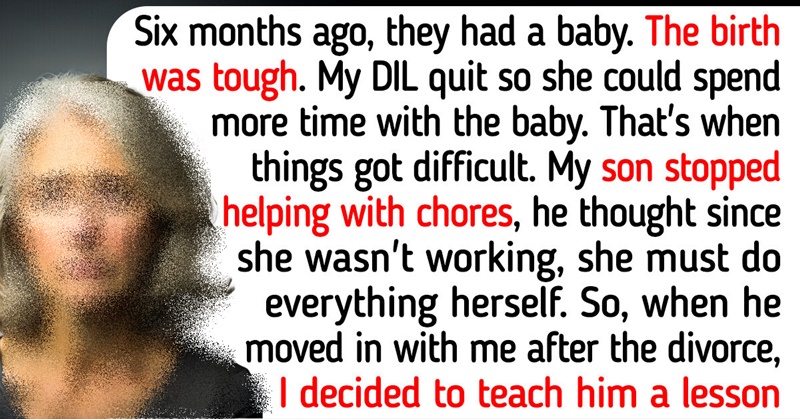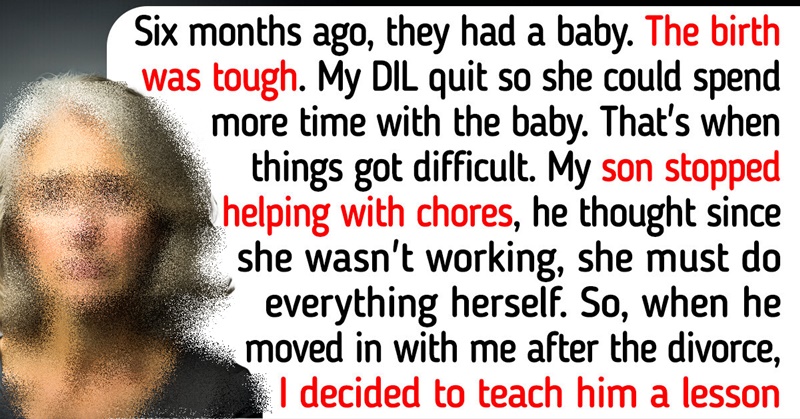Welcoming a baby to the family is an exhilarating time, brimming with excitement and anticipation. But let’s face it, having a child also shakes up the dynamic between parents in unimaginable ways. It’s not just about cooing at the little bundle of joy; it’s about testing the resilience of the bond between partners.

The couple had been together for 10 years.
Camila sent a heartfelt letter to us, sharing her story and asking for advice. She poured her feelings out:
“Hi! I’ve always enjoyed your platform because it’s a space for candid thoughts and open sharing. I’ve been a part of discussions here before, giving advice and sharing my views on different stories. Now, I need some advice from your audience about a dilemma with my son.”
Starting her story, she said, “My son, Michael, always had a tenacious streak. As a kid, he was ambitious and driven in everything—from academics to sports. I admired these traits and encouraged them. However, as he got older, his determination sometimes morphed into a harshness that concerned me.
Michael married Lisa in college. She matched his ambition and intelligence, and they quickly bonded over their shared interests and similar personalities. After graduating, they both carved out successful careers and enjoyed a generally smooth relationship.”
Her son’s behavior drastically changed after the birth of the child.

“But everything changed six months ago when their child was born. The birth was challenging, so Lisa decided to quit her job instead of returning after maternity leave. She wanted time to recover and spend with the baby.”
“Michael began criticizing Lisa over small things. The house wasn’t clean enough. Dinner wasn’t on time. He’d come home and find her napping or watching TV, and it enraged him. He didn’t see the sleepless nights, the constant care the baby required, or the never-ending chores she managed during the day. To him, it looked like laziness.
My son stopped helping with household chores, insisting that since Lisa wasn’t working, she had ample time to handle everything, while he was too exhausted from work to pitch in. When the tension reached a breaking point, they decided to get divorced.”
“After the separation, Michael came to live with me. Watching this unfold broke my heart. I had always tried to instill respect and empathy in Michael, but it seemed he had forgotten those lessons. That’s when I decided a new lesson was in order—one he wouldn’t forget.”
She taught him a lesson he will never forget.
She continued: “I decided to surprise my daughter-in-law with a gift, sending her on a short vacation for a week and promising to look after my granddaughter while she was away.
During dinner, I told my son that Lisa was going away for a week and handed him a list of tasks. It was a schedule detailing everything Lisa did in a single day: waking up at 6 AM, preparing breakfast, getting the baby ready, cleaning the house, grocery shopping, laundry, cooking, and countless other chores. Michael looked at the list, his expression shifting from confusion to realization.”
“‘I want you to take care of the baby and manage the house for one week, just as Lisa did,’ I said calmly. ‘No help from the nanny or housekeeper. I’ll step in if it becomes too much, but you need to understand what she went through every day.’”
In just a few days, the house turned into a disaster.

Camila continues her story, “Reluctantly, Michael agreed. The first day was a disaster. He overslept, struggled to get the baby ready, burned breakfast, and by noon, the house was a mess. By the third day, he was utterly exhausted. He couldn’t keep up with the baby, the endless laundry, and the relentless household demands.”
“At the end of the week, Michael was a changed man. He sat down with me, tears in his eyes. ‘Mom, I had no idea,’ he admitted. ‘I thought she was lazy, but she was working harder than I ever realized. I took her for granted and now I’ve lost her.’
I hugged my son, feeling a mix of pride and sadness. ‘It’s not too late to make things right, Michael. You need to apologize and show her you understand. Show her that you’ve changed.’”
This story has a happy ending.

Concluding her letter, Camila writes, “Michael took my advice to heart. He reached out to Lisa, offering his deepest apologies and acknowledging his mistakes. It wasn’t easy, and it took time, but eventually, Lisa saw the sincerity in his efforts. They decided to work on their relationship for the sake of their daughter.”
“Michael learned a lesson he would never forget. At least, I hope so. What would you do if you were in my place? Maybe some of your audience has faced a similar situation and could share advice to help save their relationship?”





